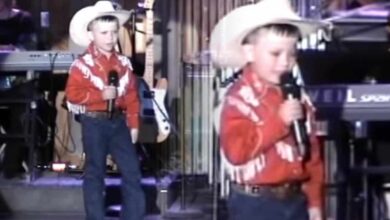Feel the Sorrow in Dwight Yoakam’s “I Sang Dixie,” A Truly Heartbreaking Country Classic
“I Sang Dixie,” a poignant track by Dwight Yoakam, emerged from his 1988 album *Hillbilly Deluxe*, which was pivotal in establishing his signature sound. This song encapsulates the essence of Yoakam’s artistry, where he deftly marries traditional country elements with modern sensibilities. Written solely by Yoakam, “I Sang Dixie” goes beyond mere nostalgia; it serves as a rich narrative that reflects on the complexities of Southern identity and the impact of music on personal history.
The emotional landscape of “I Sang Dixie” is anchored in themes of longing and introspection. Throughout the verses, Yoakam recounts the journey of a protagonist who looks back on his Southern upbringing after having ventured away, conveying a sense of homesickness intertwined with fond memories. The lyrics reveal a tapestry of memories illuminated by the songs of his youth—music that acted as a universal language, connecting him to his heritage. In the chorus, the heartfelt refrain resonates with listeners, encapsulating the power of memory and the ties that bind individuals to their roots. The imagery in the lyrics paints a vivid picture, evoking a sense of place and belonging that is a hallmark of Yoakam’s songwriting.
Musically, “I Sang Dixie” stands out for its classic instrumentation. The song features traditional country sounds dominated by a prominent steel guitar, combined with a steady, driving rhythm that enhances its lyrical content. Dwight Yoakam’s distinctive vocal style, marked by a unique twang and emotional delivery, elevates the song’s sincerity. His voice captures both the joy and melancholy of the narrative, making it relatable to a wide audience. The arrangement strikes a fine balance between classic country and a modern twist, showcasing Yoakam’s innovation within the genre while paying homage to its roots.
Upon its release, “I Sang Dixie” received critical acclaim from music reviewers, who highlighted Yoakam’s exceptional songwriting ability and the emotional weight carried by his vocal performance. It soon became a fan favorite, celebrated for its authentic representation of Southern culture and experiences. The song’s widespread appeal is mirrored in the enthusiastic reception it has garnered in live performances, where Yoakam often brings its emotional core to life, forging a connection with his audience.
Dwight Yoakam, a pioneer in the evolution of country music, emerged on the scene in the 1980s, situated at the crossroads of traditional country and rockabilly. His style has been characterized by its blend of honky-tonk influences with a rock and roll edge, setting him apart from his contemporaries. Yoakam’s dedication to his craft is evident across his extensive discography, which spans decades and showcases a variety of styles while remaining grounded in his Southern roots.
The legacy of “I Sang Dixie” extends beyond its immediate success; many contemporary artists have covered the song, acknowledging its resonant themes and timeless quality. This enduring appeal speaks to the universal experiences of longing and memory, bridging generational gaps within the country music landscape. The song’s ability to evoke strong emotional responses has secured its place in the canon of country music, and it continues to be performed and celebrated by artists and fans alike.
In dissecting the cultural significance of “I Sang Dixie,” one cannot overlook the way it captures the essence of American Southern identity. The song resonates particularly with those who have had to leave their homes for various reasons—whether for work, education, or life circumstances—yet still hold an emotional attachment to their roots. Yoakam’s narrative serves not just as a personal reflection but as a collective understanding of the bittersweet nature of home.
Overall, “I Sang Dixie” stands as a testament to Dwight Yoakam’s artistry—an embodiment of how traditional country music can communicate powerful stories while leaving room for modern interpretations. Its lyrical depth, combined with evocative melodies, showcases Yoakam’s ability to tap into the shared human experience of reminiscence and identity. As listeners continue to embrace the song, it reinforces the idea that music is not merely about sound but a vehicle for storytelling and emotional connection. Dwight Yoakam’s influence on country music is undeniable, and “I Sang Dixie” remains a powerful illustration of this impact, as it weaves together the past and present through the lens of heartfelt musical expression.





